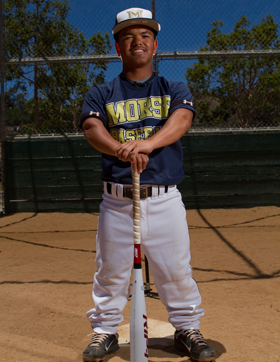Bone growth condition doesn’t stop teen from excelling
By Josh Baxt

Michael has a purple belt in judo, plays second base for the Morse High School Tigers, and this year made the citywide All-Academic Baseball Team. He also has achondroplasia, the most common form of short-limbed dwarfism.
Michael Akers is different from your typical 17-year-old. He seems calmer, more confident, more self-assured. He makes eye contact, laughs easily, and even pokes fun at himself from time to time. He walks like he knows where he’s going.
A gifted athlete, Michael has a purple belt in judo and plays second base for the Morse High School Tigers. He is a contact hitter and batted .300 as a freshman. This year, he made the citywide All-Academic Baseball Team. And with high school winding down for him, Michael is thinking about college: San Diego State and Cal State Fullerton top the list.
These accomplishments would gratify any teen but are especially sweet for Michael, who has achondroplasia, the most common form of short-limbed dwarfism. As a result of his condition, Michael is significantly shorter than his peers; however, what he lacks in stature, he more than makes up in drive. His nickname on the diamond is “Big Mike.”
“I know I’m not six feet tall,” said Michael, “but I’ll play like I’m six feet tall.”
Achondroplasia is caused by a mutation in a gene that controls bone growth (see sidebar). The mutation causes bones to stop growing too early, resulting in shortened limbs. Though it’s a dominant genetic trait, the achondroplasia mutation occurs spontaneously in 80 percent of cases, including Michael’s.
“I had never heard of this condition before,” said Alma Akers, Michael’s mother, “and no one could really explain it to me at first. When we got to Rady Children’s and saw Dr. Bird, everything changed.”
Lynne Bird, M.D., is a medical geneticist at Rady Children’s Hospital-San Diego and a professor of clinical pediatrics at the University of California, San Diego. She specializes in dysmorphology — the study of birth defects — and has taken care of Michael since he was a baby.
“Michael has done extremely well,” said Dr. Bird. “He’s had very few complications, and he’s adapted beautifully to his condition.”
For the Akers family, who are deeply religious, adjusting to the condition has been a process — and it took a little time.
“After Michael was born, I was angry at God for a while,” said Alma, tearing up. “But that didn’t last long. He’s such a blessing; he teaches me something new every day.”
Michael recognizes he is also blessed — with athletic ability, a fierce competitive spirit and innate leadership skills. For him, achondroplasia is a non-issue.
“I’m not missing a thing,” said Michael. “I look at it as a challenge — a challenge that I want to accept and overcome.”
Overcome may be an understatement. In elementary school, Michael was president of his class. Now, in addition to playing baseball, he helps coach a travel ball team and enjoys passing on his knowledge to younger players.
“Michael’s parents get huge credit,” said Dr. Bird. “They treat him like any other kid. It’s nobody’s fault, and he’s accepted just the way he is.”
But the Akers are reluctant to take credit for their son’s success. They note that he is internally driven, that his condition fuels him.
“We might have overprotected him when he was younger, but we worked through it,” said Alma. “If we babied him, he wouldn’t have been able to survive on his own.”
There is no babying in the Akers family. Michael is held to the highest standards, especially for academics. The Akers are proud of his athletic achievements, but that doesn’t mean he gets to ignore the books. The rule is that he maintains a 3.5 GPA to play baseball, well above the school requirement.
Still, it hasn’t been easy for Alma. She remembers the times in elementary school when Michael was treated poorly by other kids. Even now, she will notice someone giving him “the look.” Her anger flashes for a moment but fades just as quickly.
“He just smiles,” said Alma. “It’s always been that way. Kids were so brutal to him, but once they got to know him, that all changed.”
With years of experience, Michael has become an expert at turning people around. Sometimes, a coach who hasn’t met him will scan his height and give him a dubious look. But like everyone else, he is soon converted.
“People underestimate me sometimes,” said Michael, “But sooner or later they understand — I’m not here to play games.”
Originally published in U-T San Diego, October 2012